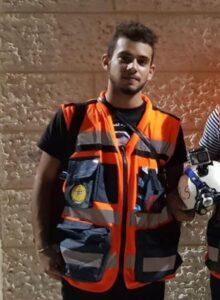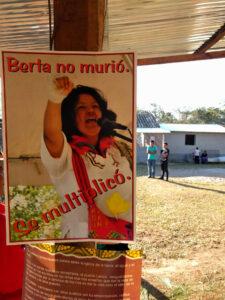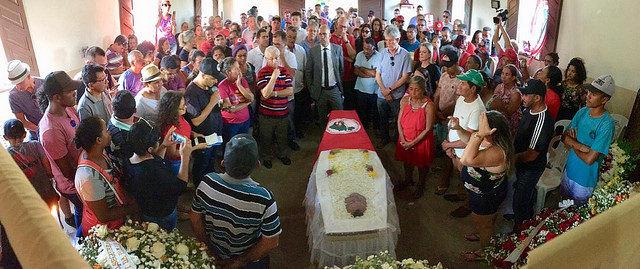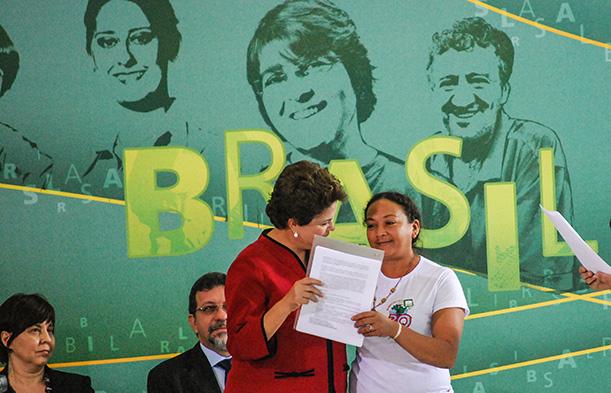Say Their Names: Sajed Mizher, Presente
The roll call of the dead and injured partners – just this year alone – staggers me. Each name a precious person, a son or daughter, a parent, a friend. Each a bright shining star snuffed out by repression, greed, dehumanization and apathy.

This morning we added another name to the list: Sajed Mizher. A young man who grew up in the Dheisheh refugee camp, Sajed volunteered with the Palestinian Medical Relief Society to help fill a massive health care gap widened every year by Israeli occupation. While providing emergency first aid, wearing his medical uniform, Sajed was shot in the abdomen by Israeli forces. He died from his wounds at the hospital. He was 18 years old.
Sajed Mizher, presente!
Over the 10+ years I’ve been at Grassroots International, we have all-too-frequently gathered as a staff to cry together, to light candles in the darkness of yet another tragedy or loss, to remember and name the people we are honored to call partners. This is part of what it means for us to be in solidarity, to be in resistance, to love. We say their names. We honor their lives, including the women and men we’ve shared meals and strategy sessions with, and those who, like Sajed, work or volunteer with our partner organizations but whom we have never met face to face. And now we never will.
With a broken heart but whole spirit, I remember the names of some of our friends, colleagues, allies and partners who have left us all too soon. They join the host of ancestors urging me onward, because the journey toward justice is not yet finished.
Geronimo Sol Ajcot was a member of the National Indigenous and Peasant Coordination of Guatemala (CONIC) until he was gunned down on Monday, March 11, 2013, while walking to work at a farm. Sixty-eight year old, Geronimo had received death threats earlier because of his work for Indigenous and peasant rights. Six armed men turned that threat into a tragic loss for the community in the village of Chacayá, Santiago Atitlan, Solola.

Berta Cáceres, who fought against the construction of a dam in Indigenous territory and was murdered for her leadership in defense of the affected communities. Berta was the co-founder of our partner the Civic Council of Popular and Indigenous Organizations of Honduras (COPINH). Through COPINH, Berta organized her Indigenous Lenca community to resist the building of the Agua Zarca hydroelectric dam on a sacred river in their territory as well to stop logging corporations’ destruction of their homes. Her death, however, has not killed her movement. As her friends and allies have been saying, “Berta did not die. She multiplied.”
Rodrigo Celestino and José “Orlando” Bernardo da Silva, coordinators for the Landless Workers Movement (MST) in the Dom José Maria Pires camp, were murdered in 2018. 450 families that live in the camp where Rodrigo and José organized. The MST issued a statement demanding justice and punishment for the culprits for assassinating rural workers. It reads in part: “In these times of anguish and of doubts about the future of Brazil, we cannot let those who have political and economic power control our destiny. Therefore, we continue reaffirming our struggle in defense of land as the central issue to guarantee dignity to the workers of the city and the countryside.”

Marielle Franco, a councilwoman from Rio de Janeiro. She was a favela-raised Black, lesbian, human rights activist who openly opposed to the militarization of her city, especially poor and Black communities. Two men suspected of killing her were arrested, both linked to a powerful militia. The ultimate authors of the assassination – those who gave the orders – remain unknown.
Cicero Guedes, a former sugar cane cutter turned land rights activist, worked in Campo dos Goytacazes, a settlement in Brazil. There he organized with the Landless Workers Movement (MST) to help families achieve what he had received: legal claim to land as part of Brazil’s agrarian reform movement. For his tireless work, Cicero was murdered in 2013, shot more than a dozen times while he rode his bicycle to the fields. His assassination seemed intended to send a message to other would-be land rights activists: organize and you will pay the ultimate price.
Nilce “Nicinha” de Souza Magalhães was one of the leaders of the Movement of People Affected by Dams (MAB). MAB advocates for the rights of people affected by the construction of dams, and for energy sovereignty. Before her murder in 2016, Nicinha denounced human rights violations perpetrated by the consortium Sustainable Energy of Brazil (Energia Sustentável do Brasil – ESBR) in the construction of the Usina Hidrelétrica (UHE) in Jirau, Porto Velho.

Dilma Ferreira Silva was an activist with MAB in Pará, Brazil, killed along with her husband and other relatives. The Tucuruí hydro-power dam flooded Dilma’s city when the dam gates opened. After 30 years, she and her community haven’t received any kind of compensation for their losses. When asked by Amazonia Portal why she was a part of MAB in 2011, Dilma answered: “What gives us strength is the movement, is the struggle not to let what we have suffered to happen to others.”
Lesbia Yaneth Urquía Urquía, a member of COPINH (Civic Council of Popular and Indigenous Organizations of Honduras), was brutally killed just four months after the assassination of Berta Cáceres in 2016. Lesbia Yaneth defended the rights of Indigenous communities and opposed the privatization of rivers in La Paz, Honduras. Since the 2009 military coup in Honduras, over 100 environmental activists (including Indigenous Peoples, peasant leaders, and more) have been killed, and thousands criminalized and jailed.
These are some of the names we say today. We know of hundreds more – from Palestine, Guatemala, Honduras, Haiti, and everywhere people stand up for their rights. I remember the words from our partners the Landless Workers Movement which speak to the power and promise of the legacy of these human rights champions, and our responsibility to carry on:
The Xukuru Indigenous People, from northeast Brazil, say that when we lose a warrior, we do not bury her. We plant her. Because from her seeds will be born many other warriors. The seeds of the struggle for a better world, where the land is in the hands of the people who live and work it; where water and all natural resources are a heritage of peoples; where there is healthy food for all people; where there are no exploiters or exploited.
We now have the duty of watering that seed of struggle. Grow it, care for it. In each mobilization; in each march; in each land occupation; in every struggle; the seed and the presence of [our friend] will be with us.
